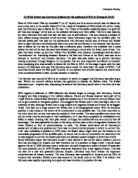Ewan Stevenson L6 Creighton History CFR
To what extent were Germany to Blame for the Outbreak of WWI
Germany's invasion of France via Belgium was the initial act of war that brought about the commencement of war. However, is it fair to say that it was Germany and Germany alone who acted to bring about this first step? I would argue that a series of events led to the German invasion of Belgium, but to what extent could Germany be blamed for this series of events?
Although they always feared the possible revolutionary consequences of an international conflict, German leaders had sometimes considered war as a panacea for foreign and domestic problems; war should split the alliances against Germany and unite the people in a wave of nationalism or even initiate some form of dictatorship based on the military.
Germany was a new power in Europe; the unification of Germany under Prussian leadership in January 1871 was the result of the brilliant diplomacy of Otto von Bismarck who by skilful use of war, and his excellent methods of convincing others of his good intentions created the new empire. However, the emergence of the German empire had upset the balance of Central Europe maintained for centuries by the Holy Roman Empire and temporarily sustained by the German Confederation. Many people believe that the invoking of hatred within France by the creation of this new empire and the mistrust of the other surrounding empires over Prussian expansionist tendencies led inevitably to a European war. The fact that war was averted for nearly forty years was due to Bismarck's brilliant diplomacy. He managed to convince the other European powers that Prussia's only ambition was to consolidate its gains and not to expand further. He also made a series of complex treaties with Russia, Austria and Italy. The basic outcome of this web of agreements was that Germany had a neutrality pact with Russia in the event of an Austro-Russian war, whilst promising support to Austria and Italy in the event of a war with another country. These treaties succeeded in isolating France a kept the peace for a considerable time, in this way what Bismarck achieved was momentous. Whether, had Bismarck continued as German Chancellor after 1890 on the accession of Wilhelm II, war may have been averted we will never know. It is unlikely that Bismarck's delay could have been sustained indefinitely even had Bismarck remained as Chancellor. However, war, if inevitable, would have come about in a different way under Bismarck as he would have never allowed the alliance system of 1914 exist had he been in power.







